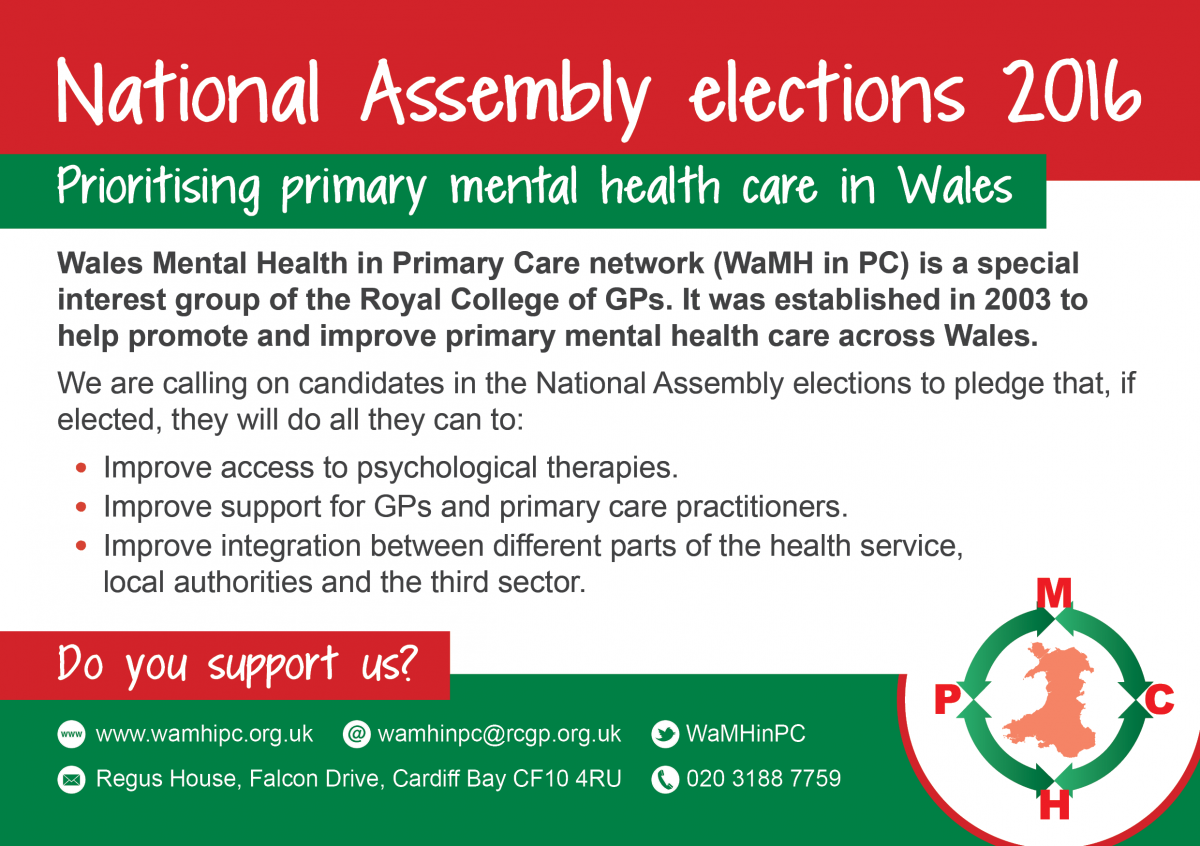SiteAdmin's blog
WaMH in PC highlights Assembly election priorities

Last year WaMH in PC published a report about people’s experiences of delivering primary mental health care in Wales. Building on the recommendations from this report, we are calling on candidates in the upcoming Assembly elections to pledge that, if elected, they will do all they can to:
Improve access to psychological therapies: In our most recent practitioner survey, access to psychological therapies was identified as the biggest barrier to delivering effective primary mental health care in Wales. Although the Mental Health (Wales) Measure 2010 has started to improve access, we know that waiting times for one-to-one psychological therapies are still too long for too many people. We urge the next Welsh Government to build on its work over the past few years and do more to reduce these waiting times in the future.
Improve support for GPs & primary care practitioners: Our survey also indicated that mental health is becoming an increasing part of the primary care workload and that GPs and other primary care practitioners would like more support to deliver high quality care. The survey also identified that primary care workforce is feeling under pressure and would benefit from more support to look after their own mental health and wellbeing. We urge the next Welsh Government to ensure that GPs and other primary care practitioners receive more information, training and support so that they can best support people with mental health problems and look after their own wellbeing.
Improve integration between different services: Our survey also highlighted problems with communication and integration between different parts of the health service, as well as between health, local authorities and third sector services. Bureaucracy and unnecessary organisational barriers can frustrate professionals and prevent patients from getting the holistic support they need in a timely manner. We urge the next Welsh Government to improve integration between services.
The full report can be downloaded here.
How can you help?
Thanks for your support!
Volunteers Required for Brain Imaging Research
A leading medical research centre in Wales is calling on volunteers to come forward and help it gain a greater understanding about the causes of mental illness.
The National Centre for Mental Health (NCMH) brings together world-leading researchers, healthcare professionals, patients and carers to improve and supoprt our understanding of mental health and illness.
The Centre is looking for people aged between 18 and 65 years who do not personally have a mental health condition to take part in their Neuroimaging Research programme.
Neuroimaging - or brain imaging - covers a range of methods which provide a snapshot of a person’s brain through the use of MRI (magnetic resonance imaging) and MEG (magneto-encephalo-graphy) techniques.
In turn, this helps define the structure of the human brain and how it functions when someone performs a task and NCMH hopes to use this information to find out how genetic risk factors affect our mental health.
The Centres hopes this help it to better identify those at greatest risk of suffering from mental health problems and develop treatments targeted at biological causes rather than only the symptoms of mental illness.
The research is set to take place at Cardiff University Brain Research Imaging Centre (CUBRIC) and if you're interested in taking part please email Lisa Brindley at brindley@cardiff.ac.uk or call her on 029 2087 6506.
Established in 2011, NCMH is Wales' first biomedical research centre and is part of the Welsh Government's research infrastructure funded by National Institute for Social Care and Health Research (NISCHR).
Time For Change Issues Tips For Talking In Bid To Tackle Mental Health Issues
Talking about mental health with those who suffer from these problems can strengthen friendships, aid their recovery, break down stereotypes and take the taboo out of something which is so often seen in a negative light.
The new Time To Change online and TV ad campaign aims to help people come to terms with their mental health problems through simple conversation and has issued a few tips on how to start things off on its Tips for Talking web page.
Most people find it difficult to talk about mental illness but the campaign says you don't need to be an expert on mental health to talk about what is normally seen as a very sensitive subject.
According to Time To Change, it's often the everyday things that make a difference – like asking ‘How are you?’ or sending a text and its set up a series of printable Talking Tip card to help remind you how simple helping someone suffering from a mental illness can be.
There are lots of simple, everyday ways you can support someone who has a mental health problem where small things can really make a big difference. All you have to do in many cases is be there to listen, keep in touch and remind them that you care.
The organisation's Tips for Talking are part of a larger campaign where it is asking people across the UK to start a conversation about mental illness.
The campaign explains how you don't need to be an expert to talk about mental health issues and centres around the fact that 1 in 4 people will experience a mental health problem in any single year.
Statistically this means that you're more than likely to know someone who has been affected by a mental health issue and below are some of the stars of the campaign explaining how simply talking can make a difference.
Time to Change is a campaign aimed at ending mental health stigma and discrimination across the UK and you can find out more about its latest "Start your conversation" adverts by visiting its Talk about mental health web page.
Alternatively, if you want to find out more about mental health across Wales please visit the various sections of our website for further information about a whole range of these kinds of issues.


